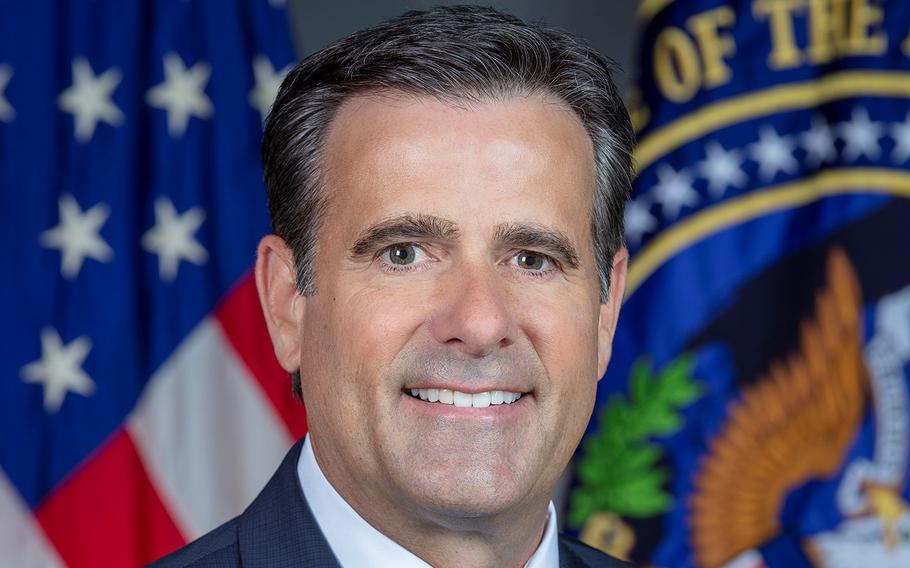U.S.
John Ratcliffe, Trump’s CIA pick, pledges not to politicize spy agency
The Washington Post January 15, 2025

John Ratcliffe, who served as director of national intelligence in Trump’s first term, appeared likely to win easy confirmation after his appearance before the Senate Intelligence Committee, where he found a warm reception. No senator disclosed plans to oppose his nomination. (U.S. government)
President-elect Donald Trump’s choice to head the Central Intelligence Agency pledged Wednesday that he would not impose political litmus tests or skew intelligence at the spy agency, rejecting concerns he might politicize an institution that Trump has frequently described as part of a “deep state” opposed to him.
John Ratcliffe, who served as director of national intelligence in Trump’s first term, appeared likely to win easy confirmation after his appearance before the Senate Intelligence Committee, where he found a warm reception. No senator disclosed plans to oppose his nomination.
The 59-year-old former federal prosecutor repeatedly sought to reassure lawmakers he would not seek to alter the agency’s code of staying out of partisan politics.
“It’s absolutely essential that the CIA’s leader be apolitical,” Ratcliffe told the committee’s chairman, Sen. Tom Cotton (R-Ark.).
Pressed by Sen. Mark R. Warner (Va.), the panel’s top Democrat, on whether he would resist firing personnel based on their perceived loyalty to Trump, Ratcliffe replied: “That is … something that I would never do.”
Trump, who takes office Monday, has long harbored deep suspicions of U.S. intelligence and law enforcement agencies, dating to their investigation of Russia’s interference in the 2016 presidential election and an intelligence finding that the Kremlin aimed to boost his campaign. He outraged current and former U.S. intelligence officials in 2018 when, after meeting with Russian President Vladimir Putin, he said he accepted Putin’s word that Moscow hadn’t meddled in the 2016 contest rather than U.S. spy agencies’ contrary assessment.
The CIA is the most powerful U.S. spy agency, responsible for recruiting and running foreign agents, conducting covert actions and providing intelligence analysis to the president and other top U.S. officials.
Ratcliffe gave only broad indications of how he would seek to change the agency. A priority, he said, will be a more muscular approach to recruiting human sources and stealing adversaries’ secrets, a core mission which he suggested has lagged in recent years.
“We all know that the human intelligence collection isn’t where it needs to be,” he told the committee.
Current and former U.S. intelligence officials have said that recruiting and communicating with foreign agents has become markedly more difficult in recent years as countries such as China deploy vast surveillance systems and border controls that hamper clandestine operations.
But Ratcliffe also appeared to blame CIA diversity, equality and inclusion programs for diluting the agency’s focus. “If you have a politically motivated, bureaucratically imposed social justice agenda that takes up part of your attention, that can distract from the core mission,” he said.
Trump transition officials have indicated they will eliminate those programs from the U.S. intelligence community and other federal agencies.
Committee Democrats sought assurances that Ratcliffe would keep politics at arm’s length in running the CIA. Several pointed to what they described as a troubling prior episode of Ratcliffe’s deference to Trump and willingness to further his political ambitions.
During Trump’s reelection campaign in 2020, Ratcliffe declassified U.S. intelligence on unverified Russian claims about purported efforts by his 2016 opponent, Hillary Clinton, to stir up scandals about him. He released the intelligence, already found not to be credible by the Republican-led Senate Intelligence Committee, over the objections of other intelligence officials, as The Washington Post and other media outlets reported at the time.
At the confirmation hearing Wednesday, Sen. Mark Kelly (D-Ariz.) said the move “put Russian disinformation into the public sphere.” And Sen. Jon Ossoff (D-Ga.) asked why he had released the material on the day of the first presidential debate — timing that, to the Democratic lawmaker, imbued the decision with partisanship.
Ratcliffe replied that he acted in response to numerous requests, “or even demands,” by legislative committees and executive branch officials. “It was my decision, but it wasn’t my process,” he maintained.
Kelly asked if Ratcliffe would have handled the matter differently with the benefit of hindsight.
“I certainly, looking back, having an opportunity to change certain things, might do that,” Ratcliffe said. “I don’t know in this case.”
But Ratcliffe predicted that his views would be vindicated on numerous issues, ranging from China’s ambitions to destabilize U.S. democracy to the origins of the coronavirus, which he has said he believes came from a Chinese lab, not a Wuhan market. On both issues, his views aligned with Trump’s.
“In terms of speaking truth to power, which sometimes includes declassifying information, most of the things I’ve done, senator, aged very well,” Ratcliffe said.
Ratcliffe also went on record in support of a hotly contested electronic-intelligence-gathering tool that has been criticized by fellow conservatives and some liberals as an intrusion on Americans’ privacy.
Section 702 of the Foreign Intelligence Surveillance Act “is an indispensable national security tool. There’s no other way to get around that,” Ratcliffe said. But it is, he conceded, “one that can be abused.”
U.S. intelligence officials have described the eavesdropping powers under Section 702 as vital to disrupting terrorist plots, tracking fentanyl and other narcotic cartels, and disrupting adversaries’ weapons programs.